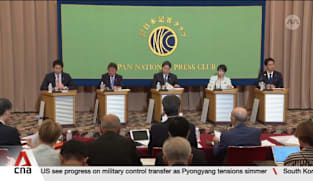Committee of Supply 2023 debate, Day 4: Desmond Choo on challenges of an ageing workforce
In Parliament on Wednesday (Mar 1), Speaker Tan Chuan-Jin dealt with the expenditure estimates for the Ministry of Manpower. Following that, MP Desmond Choo said Singapore is facing “a serious cliff-drop” as its society ages and the workforce shrinks. This could fundamentally unsettle the economy and society. Certain industries with a higher share of senior workers such as land transport, F&B, and plant and machine operation could be hollowed out. Technological developments might also accelerate the trend. Mr Choo said preparing for an ageing workforce has to become an economy-wide priority. Industry transformation maps should include a pillar on creating and transforming “age-friendly” jobs. It is no longer enough to create jobs that are of high economic value; there must also be a focus on jobs that older Singaporeans can and will do. Solutions must be found for SMEs which hire the bulk of workers, especially older ones. Singapore’s work structure also needs to be redesigned to create more part-time work or micro jobs suitable for mature workers. This will cost more, said Mr Choo, but it should be seen as a social compact imperative, just as society pays more to support lower-wage workers. He also called for specialised job placement centres for older workers and research centres dedicated to helping workers stay employed for longer, as well as the development of assistive technology. Finally, Singapore’s ageing workforce requires it to take a more nuanced approach to its foreign workforce framework. Mr Choo said certain high-touch industries may be kept for a larger core of older Singaporeans while others, especially the ones involving physical work, will need more foreign support.
In Parliament on Wednesday (Mar 1), Speaker Tan Chuan-Jin dealt with the expenditure estimates for the Ministry of Manpower. Following that, MP Desmond Choo said Singapore is facing “a serious cliff-drop” as its society ages and the workforce shrinks. This could fundamentally unsettle the economy and society. Certain industries with a higher share of senior workers such as land transport, F&B, and plant and machine operation could be hollowed out. Technological developments might also accelerate the trend. Mr Choo said preparing for an ageing workforce has to become an economy-wide priority. Industry transformation maps should include a pillar on creating and transforming “age-friendly” jobs. It is no longer enough to create jobs that are of high economic value; there must also be a focus on jobs that older Singaporeans can and will do. Solutions must be found for SMEs which hire the bulk of workers, especially older ones. Singapore’s work structure also needs to be redesigned to create more part-time work or micro jobs suitable for mature workers. This will cost more, said Mr Choo, but it should be seen as a social compact imperative, just as society pays more to support lower-wage workers. He also called for specialised job placement centres for older workers and research centres dedicated to helping workers stay employed for longer, as well as the development of assistive technology. Finally, Singapore’s ageing workforce requires it to take a more nuanced approach to its foreign workforce framework. Mr Choo said certain high-touch industries may be kept for a larger core of older Singaporeans while others, especially the ones involving physical work, will need more foreign support.



















